Biography of Dr. Cheddi Jagan
 Apprenticeship
Apprenticeship
Cheddi Jagan regarded his victory as the people's victory and said in a post-ballot speech: "We the people have won. Now the struggle will begin." From then on the legislature became a battleground. Cheddi himself reflected later that getting into the legislature was an end of sorts but "only the beginning of the long and hard struggle ahead."
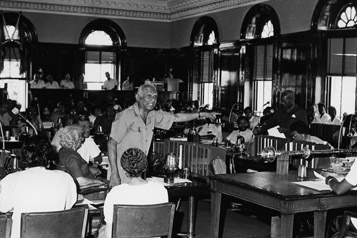
Cheddi Jagan in Parliament in the 1970s & 1980s
A different kind of politics was taking shape. Cheddi would take the interest of the ordinary man into the legislature and he would later take to the street corners to expose the rulers and their ploys to continue to exploit the people. In the legislature, for a while, he teamed up with the labour Party which had won 6 of the fourteen seats but soon broke ranks when he found they were not willing to speak out against the planters and would not oppose the various manipulations used by the colonialists to remove the wealth created by the people out of the country.
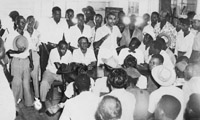
Cheddi Jagan speaking to
members of the
Sawmill & Forest Workers' Union
members of the
Sawmill & Forest Workers' Union
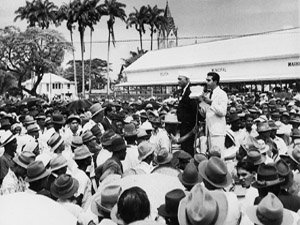
Cheddi Jagan addressing workers in 1948/
Funeral for Enmore sugar workers
Funeral for Enmore sugar workers
"The Enmore tragedy affected me greatly. I was personally acquainted with all the young men killed and injured. The funeral procession headed by my wife, other leaders and myself to the city 16 miles away became a mass protest demonstration. At the graveside the emotional outburst of the widows and relatives of the deceased had been intensely distressing and I could hardly restrain my tears. There was to be no turning back. There and then I took a silent pledge – I would dedicate my entire life to the cause of the struggle of the Guyanese people against bondage and exploitation."
The stage was set to carry out the objective set by the PAC – the formation of a political party. And so in 1950 was founded the People's Progressive Party (PPP) with Forbes Burnham as Chairman, Janet as General Secretary and Cheddi as Leader, and the Thunder, as the official PPP organ.
Cheddi Jagan from these early years felt the need for international solidarity, and as often as he could made trips abroad - to many of the Caribbean islands, United Kingdom, Berlin (German Democratic Republic) and the United States.
 Victory and 133 Days in Office
Victory and 133 Days in Office
From its inception, the colonialists attacked the Party but they maintained a clear focus on the 1953 general elections when, for the first time people came out in large numbers to demand a better deal and against the colonial masters in an organised way. Practically, all the forces ganged up against the PPP. The anti-Communist bogey became a main weapon against the Party. The church entered the fray mainly because of PPP policy to bring education under government control. These attacks failed to have much impact on the PPP"s support and at the end of the polls, the PPP won 18 of the 24 seats in the 1953 general elections.
The PPP had succeeded in rallying all sections of the population to stand up for a free Guiana. Trouble began when it was time to select ministers.
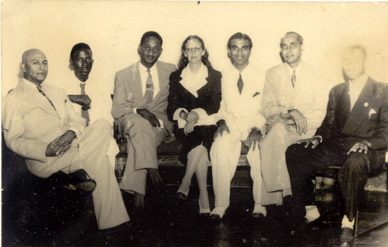
Janet Jagan with members of the 1953 Cabinet
Burnham demanded to be "leader or nothing." The party was plunged into a crisis for nearly a week. It ended with a compromise in the naming of ministers, including Janet Jagan being dropped. The new government was formed, headed by Cheddi Jagan as Chief Minister. Real power, however, continued to reside in the hands of the British. The PPP were in office but not in power.
In spite of constitutional limitations, the government introduced progressive measures to ease the plight of the working people. They implemented changes in the educational system, reform to local government, giving more rights to farmers, increased rates for workers and improved drainage and irrigation to boost agriculture. These changes seemed modest given the many demands of the people but these drove fear in the British. Every move was deemed communist by the British and local reaction. The planters were angered when they introduced the Labour Relations Bill, fashioned after American and Canadian legislation, that provided a poll to determine the union of the workers’ choice.
 Suspension of the Constitution
Suspension of the Constitution
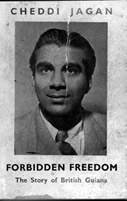
Cheddi Jagan's book
"Forbidden Freedom"
"Forbidden Freedom"
Cheddi Jagan in his book "Forbidden Freedom" (published in 1954 while he was in prison) recorded this episode thus: "Our 133 days in office had demonstrated our concept of democracy. Now the British and our opponents in Guiana demonstrated theirs."

Dr. Jagan addressing the Lok Sabha in India
with Prime Minister Nehru and Forbes Burnham
with Prime Minister Nehru and Forbes Burnham
The Americans also gave their blessings to the British gunboat action.
The PPP called on its supporters to remain calm, quiet but firm. They called for civil disobedience and passive resistance.
On October 1953, Cheddi Jagan and Forbes Burnham attended the House of Commons debate on the Suspension of the Constitution in London and later visited India at the invitation of Prime Minister Nehru.
